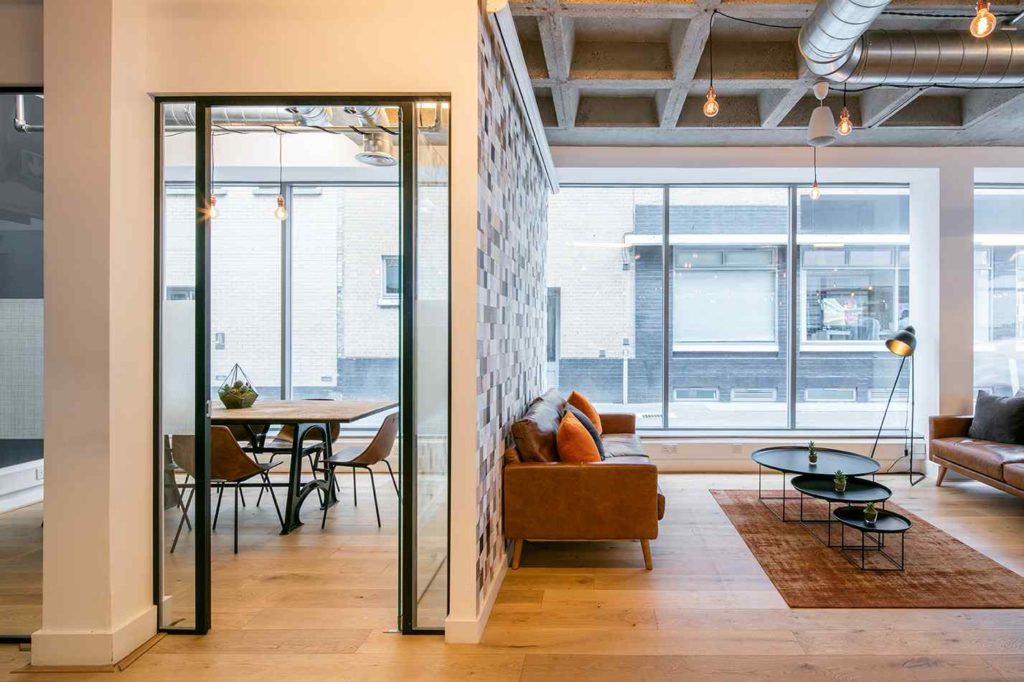The pandemic has triggered a change in how we think about office work, and the growing flexible co-working industry offers a solution.
If the past year has tested anything on a global scale, it has been our ability to improvise and adapt, creating a demand for alternative ways of living and working. The pandemic has challenged the traditional binary of either working at home for yourself or working in an office for a company. Therefore, it seems fitting that the prediction for the future of work is as broad as “Work From Anywhere”.
The Evolution of the Flexible Workplace Movement
When the co-working movement burst onto the scene fifteen years ago, people wondered whether it would survive. It was originally targeted at independent mobile workers, young start-ups, and entrepreneurs, but what started as an experimental movement has become a disruptive industry and it seems that flexible workspaces are here to stay.

Recent statistics estimate that there are now over 35,000 flexible workplaces across the world, and their global market value stands at approximately $26 billion. Furthermore, the flexible workspace market is defined by the increase in the number of start-ups globally, a number that has rocketed in recent years. In 2019, the global start-up economy was valued at $3 trillion, with a rise of 20% from 2017 and 2018. The industry is certainly expected to have a bright future, with a recent Research and Markets report predicting the co-working industry market to grow from $7.97 billion in 2020 to $8.14 billion in 2021, finally expecting it to reach $13.03 billion in 2025.
The effects of the pandemic have been twofold: while the industry has certainly suffered negative effects, it has also created the twin demands of flexibility and “the human touch”. Embodying both of these needs, co-working spaces are becoming fast-growing realities, with 86% of respondents from research conducted in 2020-21 viewing flexible office space as a key element of their future real estate strategies.
A New Approach to Office Work
Tori Donnelly, Co-founder & Head of Brand at WorkClub and Opportunity Network member, stresses that while the office is a key to business success and will undoubtedly remain essential, its traditional concept has changed and will continue to evolve.
“At WorkClub”, explains Donnelly, “we are leading the charge by working with a diverse range of space operators, such as hotels, pubs, and restaurants, to provide a creative space for all individuals to thrive in. It gives remote professionals access to a distributed network of flexible workspaces in every city, town, and village across the UK”. Its unique approach truly embodies the improvise-adapt-overcome nature of flexible working, reflecting the global “new normal” which, far from being a norm, comprises a range of attitudes which vary by industry and region.
Finding the Balance Between Remote & Office Work
There are a number of benefits to flexible working spaces. A recent study conducted by Gartner concluded that 71% of HR leaders are more concerned this year about employee collaboration than they were before the pandemic.
A key fear shared by employers during the pandemic has been losing the “common culture” responsible for generating employee cohesion and driving productivity. Coworking spaces provide a solution. In the context of a hybrid work environment, those employees who thrive on working in a collaborative space are able to do so. The pandemic’s financial impacts must also be taken into consideration: flexible workspaces again offer the possibility to scale office space up or down based on a firm’s evolving needs.
However, there are things to consider. Donnelly admits that while remote working can be conducive to productivity, it can also impede it by leaving you isolated or subject to distractions. She suggests finding a balance, as the alternative of working in an office cubicle five days a week can also negatively impact productivity levels. It’s a question of finding “the best of both worlds.”

Global research findings agree; productivity levels are at their optimum when employees work from wherever they work best. Companies like WorkClub are driving individuals to discover these. It seems that their mission could not come at a better time, with 72% of workers currently preferring a mix of both in-person and remote work, as reported by Slack.
The Effects of COVID-19
The pandemic has undoubtedly strained the flexible workspace industry. If its principal aim is to bring people together, this has inevitably been curtailed by lockdowns and social distancing measures.
Donnelly explains that, in order to ensure a safe and secure working environment for all their members, WorkClub has implemented a voluntary Safe Space Pledge. This encourages their spaces to take the necessary steps to ensure that their facilities go the extra mile beyond government requirements to support the health and safety of their members.
The pandemic has also meant that geography has become an important factor in determining the success of flexible workspaces: suburban spaces tend to generate the most income, as people choose to leave cities to settle in more suburban areas.
However, the inherent nature of the product means that it appeals to the new way of work. According to a study published in The Economist, before the pandemic, Americans spent 5% of their working time at home, but by spring 2020 the figure had reached 60%. A change would be an understatement. Traditional office culture has had to alter dramatically, and with it comes the demand for alternatives.
Donnelly agrees, citing three principal reasons why the pandemic has accelerated the need for coworking spaces.
- Practicality
Remote professionals need somewhere to work. A home office is not a long-term solution. - Adaptability
Secondly, alternative workspaces are a crucial support structure for businesses of all sizes. They provide a place to meet and network outside the typical office setting. - Networking
Co-working offers social opportunities and human interaction, invaluable within the context of the pandemic.
These explain why flexible workspaces have become so valuable to businesses across the globe. Nonetheless, it is not just the increased interest from firms that signals their success, but also the considerable interest of investors, landlords, and property developers in the rapidly expanding industry.
An Increased Demand for Strong Leadership
As more and more companies seek hybrid work arrangements, it is crucial that business leaders actively create opportunities for their employees to collaborate productively. Avoiding the drawbacks of remote working, specifically, lack of cohesion and higher levels of distraction, demands careful thought and tailormade solutions from those in leadership positions.
There is vast potential in a hybrid work environment, but leaders must actively encourage collaboration. In fact, there is evidence to suggest that managers have been forced to improve their communication skills in order to boost employee satisfaction. For example, Gartner’s research has indicated the recent driver in synchronous working (i.e. meetings and presentations) has been the most effective way of driving innovation.

What to Expect Next
It does seem like flexible workspaces have a role in the future. Even if we come across exceptions such as Wall Street; the strongest supporters of the status quo can be found in leadership positions of prominent banks there.
The Economist predicts that hybrid arrangements will stay in place in most businesses. While most workers are doing longer hours, higher levels of both satisfaction and productivity have been reported. The co-working industry has been an ally in the pandemic’s demolishing of the traditional office system and stands to benefit further in the future.




